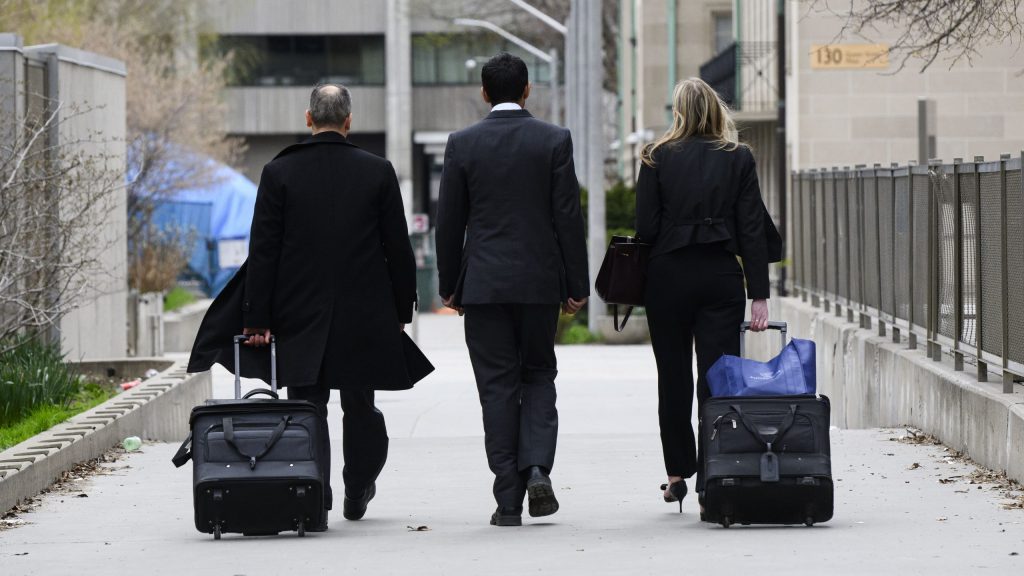Tories pushing to slay deficit, but no pressing need to balance books: experts
Posted January 14, 2014 11:36 am.
This article is more than 5 years old.
OTTAWA – Despite the death-to-the-deficit mantra being chanted by Conservative devotees, some economists say there is no real pressing need to balance the books by 2015 — just in time for the next election.
Reducing spending and eliminating jobs could damage Canada’s fragile economic recovery, some argue, while others dismiss the effort as an incremental process that will have little to no immediate effect.
The Tory plan to eliminate the red ink — which has already been put off a few times — is based more on economic growth than spending cuts, which have been fairly modest, said Sean Speer, senior director of the right-leaning Fraser Institute’s Centre for Fiscal Studies in Vancouver.
“When people are talking about deep cuts, they’re overstating what the government has done,” said Speer, who also served as a senior policy adviser to Prime Minister Stephen Harper and Finance Minister Jim Flaherty.
If the government can reduce the cost of servicing its debt and dedicate some of their future surpluses towards reducing taxes, that will have a greater impact on growth in Canada, he added.
The Tories make the same argument, but paint an apocalyptic picture of what lies ahead if they veer from their path to slay the deficit.
Junior finance minister Kevin Sorenson invoked the “dire consequences” that befell bankrupt Detroit and struggling Greece in a speech Tuesday to the Economic Club of Canada about the upcoming budget.
The next budget, which is expected next month, will keep the focus on “controlling spending and using every tax dollar as efficiently as possible,” Sorenson said in prepared remarks.
That includes a freeze on operating spending for the next two fiscal years, as well as possible asset sales.
“Balancing our books, as all business leaders know, gives us greater flexibility to respond to the unforeseen,” Sorenson said.
“It will enable us to reduce the burden placed on future generations and promote investment by keeping taxes and interest rates low.”
But “unbelievably” low interest rates and a healthy appetite for government bonds means the cost of servicing the debt is at an all-time low, said senior economist David MacDonald of the left-leaning Canadian Centre for Policy Alternatives.
“You can flow 20-year bonds at the cost of inflation,” he said. “It’s incredible.”
The provinces are running bigger deficits and households are reaching record-high debt levels, he said, while the federal debt-to-GDP ratio — about 34 per cent — is stable and will probably go down over the next few years. Harper has promised to drive it down to 25 per cent by 2021.
There’s still a lot of slack in the economy, MacDonald said. If anyone’s in a position to keep borrowing to drive growth, it’s Ottawa.
“There is in fact no pressing need at all to balance the budget,” said MacDonald. “This is not an economic problem, it’s a political problem.”
The Harper Conservatives are counting on balancing the books to help propel the party through a federal election campaign that’s scheduled for the fall of 2015. If they turn a surplus, they’d have the means to come through on past promises, like partial income splitting for families.
Governments around the world are grappling with the need to reduce deficits, but cutting too quickly could drag down the economy, said Sonya Gulati, a senior economist at TD Economics.
“There’s arguments to be made on both sides and I think politicians have to manage that and balance the good and the bad of deficit reduction,” she said.
Even the best-laid fiscal plans can go astray.
Canada’s budget watchdog noted Tuesday that the unexpected cost of dealing with recent natural disasters helped push up federal spending in the first six months of the current fiscal year than the same period a year ago.
Major floods and rain storms in Alberta, Saskatchewan and Manitoba between 2010 to 2013 have created an estimated $4.1-billion liability that may rise further if Environment Canada’s predictions of increased precipitation rates prove correct, the parliamentary budget office said in its latest report.
The storms have add a dimension of unpredictability to external demand and the price of exports, particularly commodities, Sorenson said in his speech.
“No one would have predicted that 2013 would bring the economic damage of historic floods in Alberta or massive ice storms here in Toronto,” he said.
“And as a former farmer, let me tell you, there’s no telling what the next season has in store. We face an uncertain and fragile global economy.”
The PBO also said it can’t determine whether the $5.2-billion in budget cuts are fiscally sustainable because it’s not getting enough information from the government.
Almost 40 per cent of program performance can’t be evaluated due to recent target changes or incomplete data.
“Given the government’s refusal to share the data essential to undertake a fiscal analysis of the Budget 2012 reductions, PBO staff have attempted to use existing public resources,” it said. “This, unfortunately, has met with limited success.”
It noted that cuts to program spending have resulted in the elimination of over 20,000 full-time equivalent jobs since 2010.










